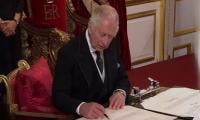LONDON: British Prime Minister Theresa May’s bid to get the EU divorce deal through parliament was hit on Monday with a bombshell announcement by the speaker, ruling MPs could not vote again on the same proposal they had already rejected.
With less than two weeks to go until a potentially chaotic departure on March 29 that could trigger an economic shock, May hoped to twist arms and have another vote on the withdrawal agreement by Wednesday.
The British government was scrambling to convince Brexiteers to give in at long last and support the twice-rejected deal. But the speaker of parliament’s lower House of Commons John Bercow said MPs could not be asked to vote again on the same deal in this session of parliament.
"What the government cannot legitimately do is resubmit to the house the same proposition, or substantially the same proposition," he said, citing precedent dating back to 1604. It is the first time in more than a century that the speaker has invoked the rule, meaning the government must find a way of substantially altering the deal before it can be voted on again.
May’s Downing Street office said Bercow had given no prior warning of his statement in the Commons. Earlier, May had been trying to get Brexiteers onside but was struggling to turn the trickle into a flood.
If MPs can back a substantially revised divorce proposition by Wednesday, then May will head to the EU summit in Brussels on Thursday and Friday and seek a short technical delay to Brexit until June 30.
If MPs cannot rally round a deal, she will seek a long delay beyond that date. To bring the same deal before MPs, parliament would have to be broken up early, before reconvening in a new session.
May will not bring any Brexit deal proposition before parliament if she is sure to lose. "Before any further vote were to take place we would want to believe that we had a reasonable prospect of being successful," her spokesman said.
May wants to be able "to win a vote this week and then only have to ask for that short, technical extension". Foreign Secretary Jeremy Hunt, citing strong critics of the deal who were now backing it, said there were "cautious signs of encouragement" but admitted there was a "huge amount of work to do" to win over hardcore Brexiteers.
All eyes are on Northern Ireland’s small Democratic Unionist Party (DUP), which May’s Conservatives rely upon for a slender majority in parliament, and the European Research Group (ERG) of Conservative Brexiteers, both of which have so far rejected the deal. "The prime minister held discussions with a number of her colleagues over the weekend. Talks have been taking place with the DUP. Those talks are continuing," her spokesman said.
European foreign ministers meeting in Brussels for pre-summit talks on Monday were broadly supportive of granting a delay but questioned its purpose. "We are not against an extension in Belgium but the problem is to do what?" Belgian Foreign Minister Didier Reynders told reporters.
Former British foreign secretary Boris Johnson, a pro-Brexit figurehead, urged May to use the EU summit to wring more concessions out of the bloc before risking a third vote. Johnson summarised the dilemma as being between a deal that is "detrimental to the interests of this country" and the "real risk that Brexit would not happen at all".
"It is not too late to get real change," he wrote in The Daily Telegraph newspaper. In a blow to May, 23 Leave-backing Conservatives wrote a joint letter to the broadsheet calling for a no-deal exit.
However, ERG leader Jacob Rees-Mogg hinted on LBC radio that he could soften his position if the DUP did, saying: "No deal is better than a bad deal but a bad deal is better than remaining in the European Union."
Brussels could handle a British request to delay Brexit received at any time right up to the final hour before the 11:00pm London time March 29 deadline, a senior EU official told reporters.
U.S. Representative Henry Cuellar. — AFP FileWASHINGTON: U.S. Representative Henry Cuellar and his wife were...
US President Joe Biden presents the Presidential Medal of Freedom to US swimmer Katie Ledecky in the East Room of the...
A representational image showing migrants waiting to be disembarked from a British border force vessel in Dover,...
Smoke billows from a vehicle allegedly burned by the Meitei community tribals protesting to demand inclusion under the...
The collapsed Francis Scott Key Bridge lies on top of the container ship Dali in Baltimore, Maryland, on March 29,...







